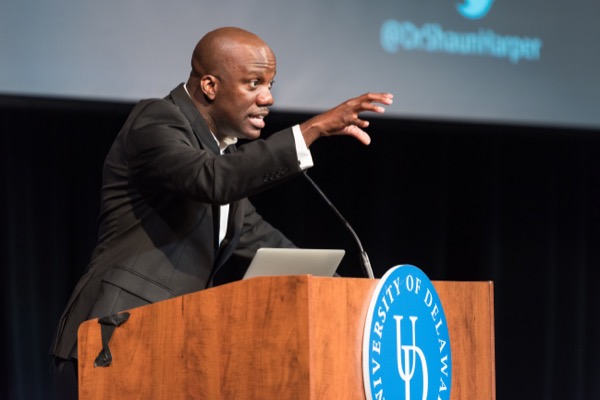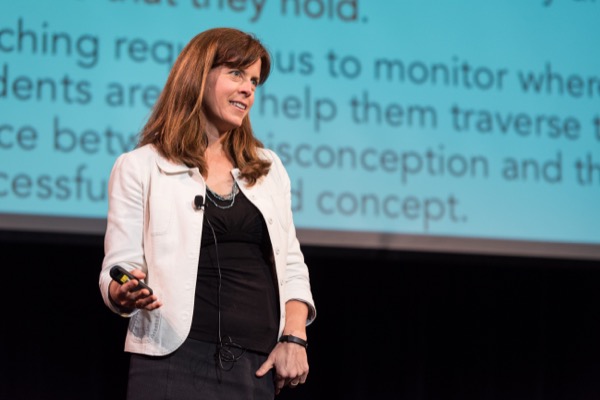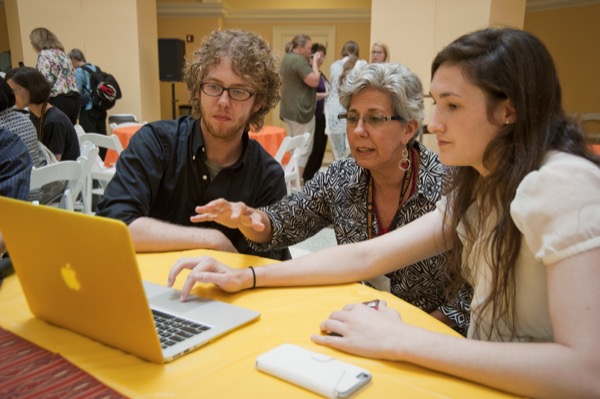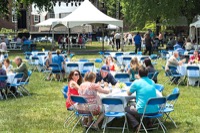


2015 SFI
Participants say 2015 UD Summer Faculty Institute a success
4:04 p.m., June 19, 2015--Participants at the 2015 University of Delaware Summer Faculty Institute (SFI) explored a variety of topics relevant to the teaching community including community engagement, critical thinking, digital humanities, digital storytelling and engaging difference.
“This year’s themes highlighted the transition that is currently happening with the integration of digital media and community/public use with research and pedagogy,” one participant noted. “I enjoyed hearing the diverse perspectives of the struggles and accomplishments with projects and courses.”
FYI Stories
June 6: UDid It! Picnic
2FA protects you
Yasser Payne, associate professor in the Department of Black American Studies at UD, offered one such perspective. His research project, The People’s Report, is a film about the violence in Wilmington, Delaware — one of the most violent cities, per capita, in America. Payne covered the various considerations that need to be taken when undertaking this kind of project including the impact on the community, the access to physical recording materials and the assessment of structural inequality.
Participants also had the opportunity to learn about community engagement in a very different context. In “Getting Our Hands Dirty: An Environmental Humanities Farm Project,” McKay Jenkins, associate professor of English at UD, described how he took students out of the traditional classroom and put the course lessons into context by having students work on an organic farm. Jenkins led discussion about how important context is when trying to engage students with the material taught in the classroom.
Several presenters explored another important aspect of a student’s experience: developing critical thinking skills. As one participant remarked, “I especially thought that the Critical Thinking track was very useful in addressing how pedagogues are shifting and how to leverage new critical thinking skills in content-based classes.”
Beth Morling, professor of in the Department of Psychological and Brain Sciences, provided an interesting perspective on critical thinking with her interactive presentation, “What is the Mental Tattoo for Your Course?” Morling asked participants to consider the threshold concepts — transformative ideas that are crucial for students to understand but that may be difficult for them to grasp — that they want students to master in each of their courses.
Morling demonstrated how course design should be centered on those threshold concepts. She provided examples of how educators can monitor where students are and how they can help students traverse the space between unfamiliarity and mastery.
Kyle Dickson of Abilene Christian University addressed another method for improving any type of class in his keynote “Digital Storytelling to Scholarly Storytelling.”
Dickson’s presentation included snippets of digital media produced by fellow faculty and students that played as he reviewed the factors that impact the effectiveness of digital storytelling. He encouraged attendees to use digital media in their classrooms — taking a snippet of lecture and transforming it into a digital video or slideshow — and reap the benefits of engaging their students in this manner.
Faculty explored another aspect of digital storytelling during an on-campus “Digital Photography Safari” led by Jon Cox, assistant professor in the Department of Art.
“I think the faculty came away with the idea that their camera phones can be a powerful tool for a variety of purposes across disciplines,” Cox said. For example, “A Short Flight from Home - At the UD Apiary,” a photo taken by Judith Hough-Goldstein, professor in the Department of Entomology and Wildlife Ecology, conveys a sense of place from a bee’s perspective.
“Our assignment was to document a portion of the Newark cultural map using our cell phone cameras, and my partner and I chose to explore the UD Apiary,” Hough-Goldstein explained.
The “Presentation Makeover” session gave participants a chance to improve another aspect of their courses. Participants learned the principles of a good presentation and how to incorporate those principles into their own presentations to fit their teaching style and personality. One participant noted that “the Presentation Makeover session was my favorite. It provided a lot of practical, hands-on information I can actually use.”
Based on survey responses at the end of SFI, faculty attending the conference walked away with new methods of improving their courses and innovative ideas for engaging students. Many attendees said they were inspired by their colleagues’ efforts at improving their courses.
“I always like the sessions that stoke my ideas for teaching. The best part of SFI is the chance to meet, re-meet and talk with faculty who are like-minded about enthusiasm for teaching, even if we are in different academic disciplines. Also, it’s always a good opportunity to ‘discover’ what’s new in academic technology, and to connect with professional staff,” one participant wrote.
“I really enjoyed this year’s conference. The speakers were well prepared and engaging. There was a good blend of new information and opportunities to apply the theory,” another participant said.
Many of the SFI 2015 sessions were recorded and are available for faculty to review. All session recordings, presentation slides and handouts are available online.
For more information about SFI or other programs hosted by the partners of Faculty Commons visit the Faculty Commons website.
Article by Lauren Elise Maxfield
Photographs by Evan Krape and Wenbo Fan










